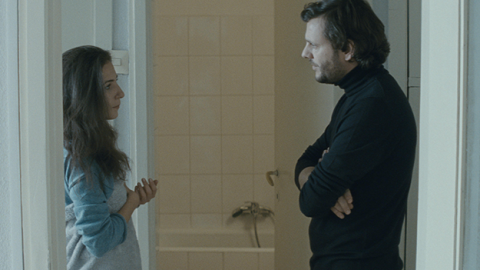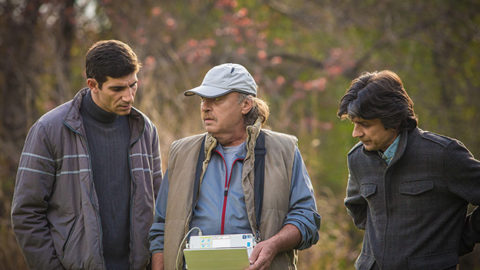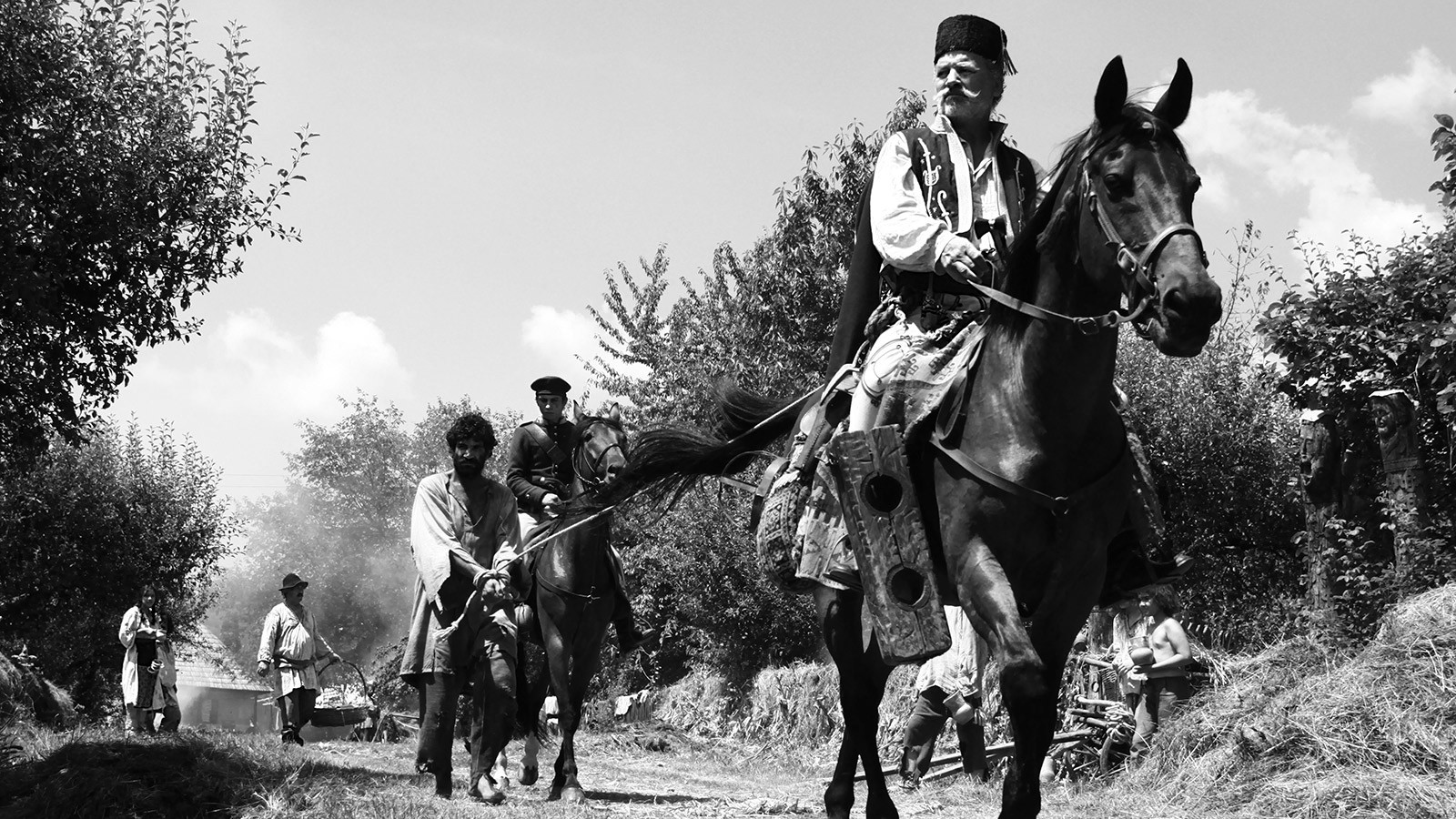
Review: Aferim!
Along with its more obvious qualities, Aferim! is a portrait of people starved for conversation. The cascade of chatter begins with a constable named Costandin (Teodor Corban), who is riding along through the Wallachian countryside in the mid-1830s in the company of his teenage son Ionita (Mihai Comanoiu). Costandin is a veritable fountain of bullshit, his torrent of dialogue peppered with folklore, aphorisms, riddles, poetry, and biblical quotations. The greenhorn Ionita occasionally gets a question in, but generally absorbs/endures his father’s jovial monologues during their journey on horseback through a mostly sunlit but somehow haunted landscape. The two are searching for an escaped Roma slave at the behest of a cruel nobleman.

I admit to a longstanding fondness for the narrative convention of a big talker paired with a silent sufferer; for further research, see Henry Fonda and James Stewart in The Cheyenne Social Club and Steve Buscemi and Peter Stormare in Fargo. Costandin’s garrulousness is the bed upon which Aferim! works its strange magic; despite subject matter that involves slavery, torture, and relentless bigotry, the film is wildly, bitterly funny. The constable takes (and gives) bribes, he casually informs his son that he’ll drown him if he learns the lad is a sodomite, and he is resolute in playing his role in the oppression of the country’s gypsy people (“but with kindness,” he notes). Yet the Falstaffian largeness of the role—and Teodor Corban’s performance—makes this character almost likable in his evenhanded stupidity.
He’s not the only big talker. One of the movie’s early high points is an encounter with a priest whose wagon has broken down. Upon the repair of the cart, the priest lets rip with a litany of vile opinions about other ethnic groups, a shouted soliloquy so hilariously specific that it even gives Costandin pause. Eventually, when the searchers find their quarry, it turns out that the enslaved man, Carfin (Cuzin Toma), is also a discursive type. He tells tales of seeing Paris and Vienna, and of carnal knowledge with the eager wife of the nobleman—the transgression that prompted his flight.
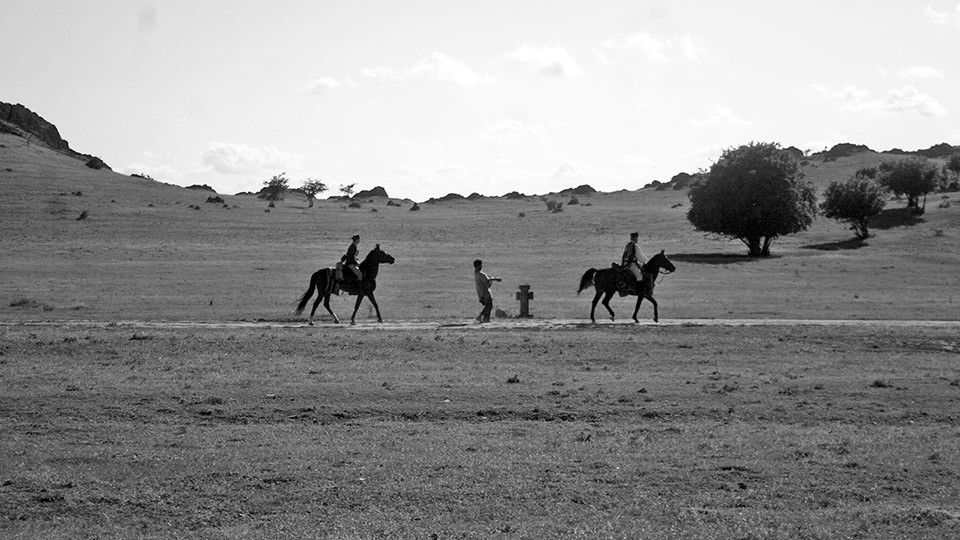
Aferim!
Radu Jude (Best Director winner at the Berlin Film Festival) and co-writer Florin Lazarescu have surely embroidered these earthy conversations out of their imagination, but they also used historical research to build the film’s nasty and brutish world. Aferim! has a furiously felt reason for being, in part because Romanian cinema has almost never dealt with the enslavement of the Roma people (slavery lasted there until 1856). The rich humor begins to curdle when Ionita suggests that perhaps they might just let this amiable prisoner loose, instead of collecting the reward money; after all, what awaits Carfin at the hands of the nobleman is probably death, or possibly worse. (It’s worse.)
Knotted throughout the film is a sustained critique of ancient masculine codes and behavior, which, alas, don’t seem especially ancient. (Ergo the film’s sense of urgency as not merely a past-history lesson.) The movie has been called a Romanian Western, and yes, there is that, although the film is as close to The Seventh Seal as it is to The Magnificent Seven. At times it feels as though it’s taking place in the Middle Ages.
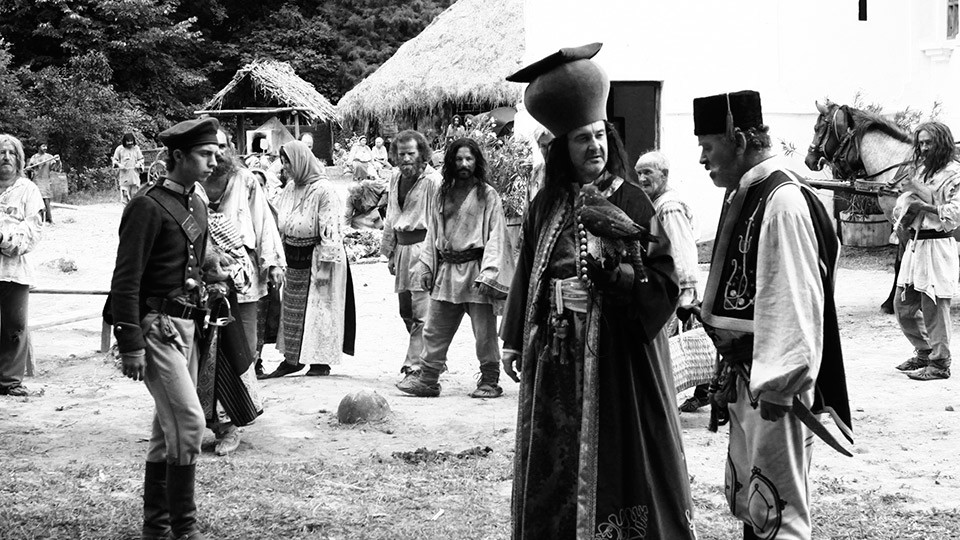
Aferim!
Jude’s decision to shoot in ultra-crisp widescreen black and white gives the film heft, and positions Costandin and Ionita not as the center-of-frame heroes but as figures in the empty sweep of landscape or the bustle of a traveling fair. Jude gets a thrilling visual flow going at times—check out the shot that includes a conversation held in the distant background and a large herd of goats passing in the foreground, a view that eventually pans with our riders to reveal another hilly vista and open trail. All right, that does look like a Western. But this Eastern Western is sick with irony and cruelty. Aferim is an Ottoman Turkish word meaning “Bravo,” a sardonic touch that rings with gallows laughter throughout this remarkable film.
Robert Horton is a writer based in Seattle.



